Would-be members of parliament are registering as candidates this week ahead of the May 14 general election that will likely result in a coalition government, observers say.
For almost a decade, the military has cast its shadow over the country – through five years of junta rule after a coup d’état in 2014 and then the election of a government with deep ties to Thailand’s generals.
Despite massive pro-democracy street protests led by young activists and students in recent years, observers foresee the military clinging to power in one way or another after next month’s vote, thanks to a 2017 constitution that, critics say, gives the generals a lop-sided edge in the post-polls formation of governments.
On Monday – day one of the registration process for candidates – most of the big names and prime ministerial hopefuls submitted their paperwork.
They were clad in party colors and led crowds of noisy supporters in motorcades in and out of Bangkok. The high-profile candidates rode in campaign trucks and, outside the registration center in the Thai capital, supporters from various parties jostled with one another under a thicket of signs displaying the photos and slogans of their election hopefuls.
Here are the main contenders to become Thailand’s next prime minister:
Paetongtarn ‘Ung Ing’ Shinawatra (Pheu Thai Party)
The 36-year-old chief strategic adviser for the Pheu Thai Party is the daughter and niece of two former prime ministers who were ousted in coups by the military, in 2006 and 2014, respectively.
Paetongtarn Shinawatra, who has been leading in pre-poll surveys as the most popular prime ministerial hopeful, is seen as the spearhead for the party’s efforts to steer the country back on a path to full democracy.
This relative newcomer to politics is hitting the campaign trail and leading her party into the polls while pregnant. She is the youngest child of ex-Prime Minister Thaksin Shinawatra, who was toppled in a coup nearly 19 years ago. Her aunt, Yingluck Shinawatra, suffered a similar fate in May 2014.
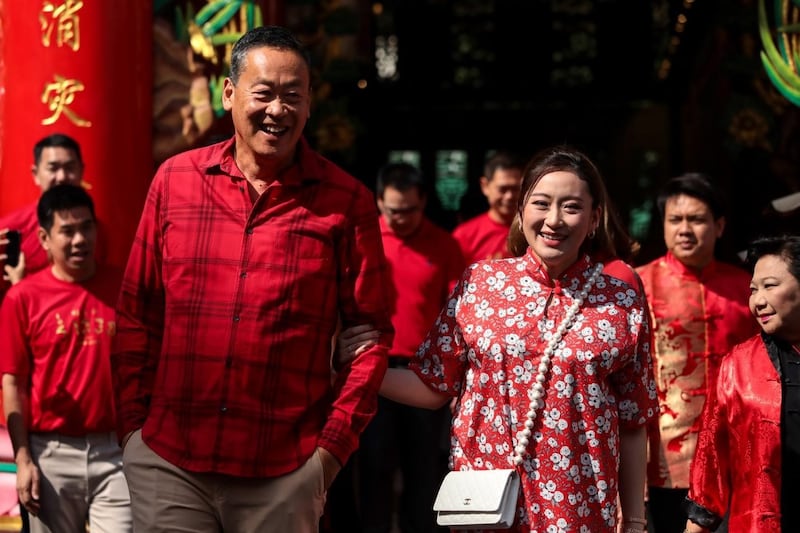
Paetongtarn hopes to resurrect the glory of her father’s Thai Rak Thai Party, which ruled from 2001 until Thaksin was forced out of office.
Pheu Thai has topped a few opinion polls which show it has a chance of winning more than half of the 500 seats in Parliament’s lower house. A landslide win could offset the military-backed 250 senators who will join the lower house in voting for the new prime minister.
Her party is campaigning on promises of better wages and a lower cost of living.
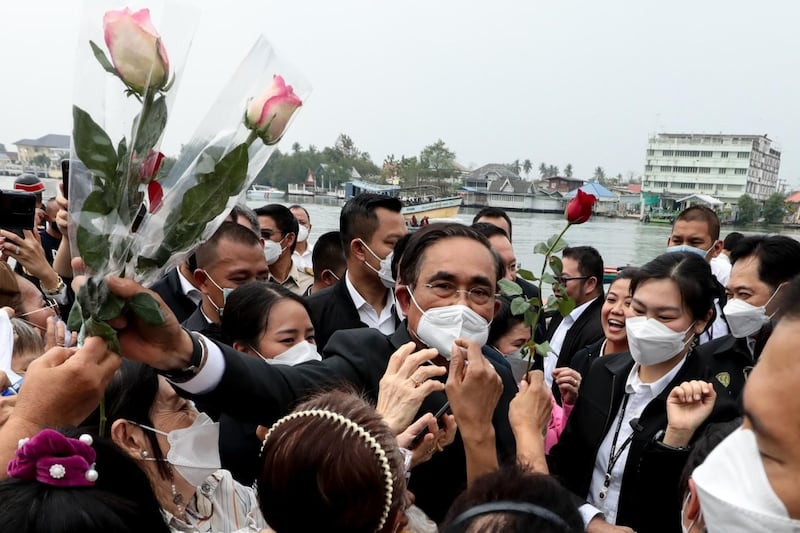
Gen. Prayuth Chan-o-cha (United Thai Nation Party)
Prayuth, 69, has told Thais he cares about their livelihoods, leading him to run for a second term as a bone fide prime minister even though he would have to leave office in April 2025 because of constitutional term limits.
The former army chief, who led the coup against Prime Minister Yingluck, is known as a staunch royalist who is liked by conservatives. Prayuth, who has led the country since 2014 – first as the junta chief and later as a full-fledged prime minister – has been on shaky political ground lately, having survived several confidence votes in Parliament.
He is pressing on in politics to safeguard the monarchy in the face of protests by the young pro-democracy activists, analysts say.
Conservatives are concerned that Thaksin’s Pheu Thai Party remains a contender, and they have come out to support Prayuth.
Campaigning under the motto, “done it, do it now and will do,” Prayuth says he hopes to carry on with his successes. Despite criticism of his government’s economic performance and his administration’s aversion to freedom of speech, Prayuth’s support programs for the elderly and the poor have proven popular.
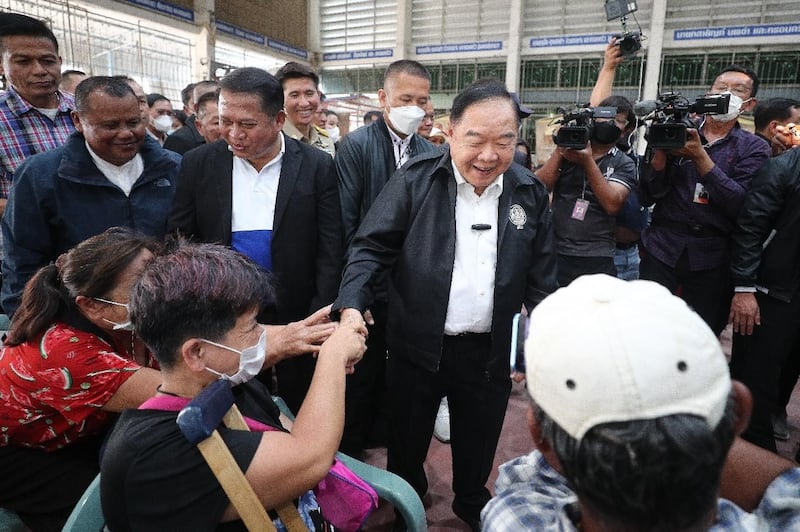
Gen. Prawit Wongsuwan (Palang Pracharath Party)
Prawit Wongsuwan, the big brother of the “3P” brothers-in-arms who backed Prayuth during the 2014 coup, made a sudden U-turn before starting his own campaign. The deputy prime minister said politicians must “get over it,” referring to past political polarization and turmoil.
Prayuth Chan-o-cha (PM), Prawit Wongsuwan (Deputy PM) and Anupong Paochinda (Minister of the Interior), three former army chiefs known as the “3Ps,” played a key role in the past two coups. In the 2006 coup against Thaksin, Anupong was the commander of the Bangkok-based army region whose members blocked forces under the control of Thaksin, his cadet classmate.
Prawit, 77, is viewed by colleagues as the PM candidate among junta members who is most likely to compromise with other parties in building a coalition to form a government.
While Prawit scored poorly in a few recent polls, the chance for his party to maintain a sizable number of seats remains, according to one analyst. Because the 250-member Senate was handpicked by the junta, Prawit could be a viable PM candidate.
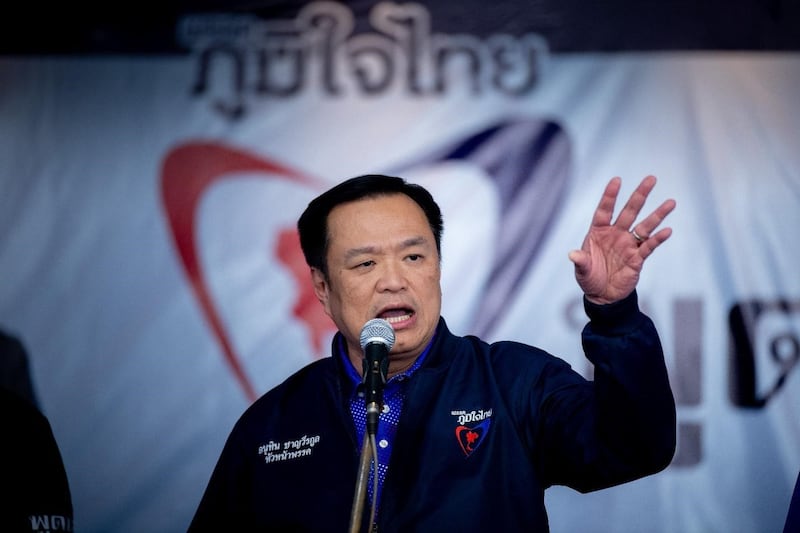
Anutin Charnvirakul, (Bhumjaithai Party)
Popular because of his stance on decriminalizing marijuana as minister of public health, Anutin Charnvirakul is seen as a wild card who can play a kingmaker role in the new election – or he could build a coalition to be elected prime minister, an analyst said. At least 43 MPs elected in the previous election have defected to his party.
He and Prawit Wongsuwon, the deputy prime minister, have a cozy relationship even as they both seek the top spot in government and likely will remain close no matter how the vote goes.
Anutin, 56, comes from the family who founded Sino-Thai Engineering and Construction, one of Thailand’s most successful companies. He bragged about his political success through the motto “Keep the Word” and is popular among grassroots people.
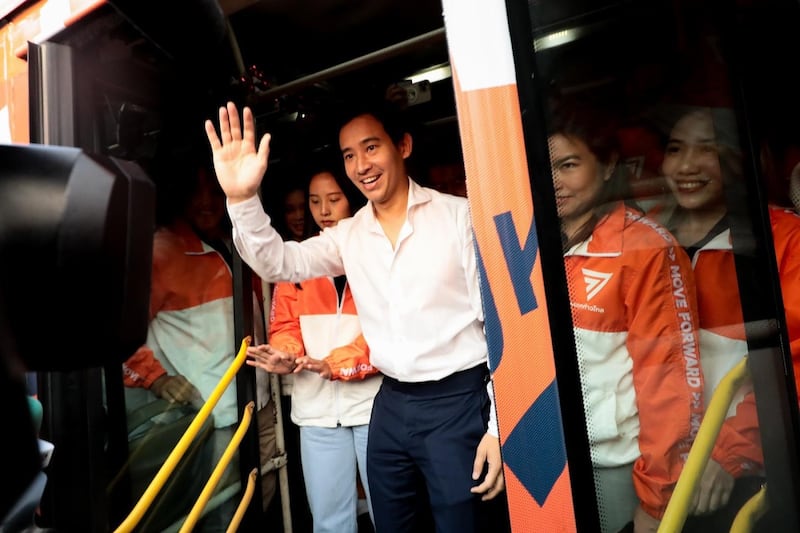
Pita Limjaroenrat, (Move Forward Party)
The leader of the Move Forward Party enjoys the support from the younger generation of Thais who have participated in pro-democracy protests since July 2020.
Pita’s is the only party that has called for the abolition of the nation’s strict royal defamation law, Lèse-Majesté, which carries a prison term of up to 15 years and has been contentiously enforced after Prime Minister Prayuth threatened in November 2020 to stop youth-led protests.
The progressive party could share the voters with the Pheu Thai Party and join forces in an effort to form a new government, analysts said.
Pita, 42, edged Prayuth in a recent PM poll, but distantly trailed Paetongtarn of Pheu Thai as the nationwide top choice.
